外贸英语函电第一章 Business Letter Writing -An Introduction
unit 1外贸英语函电--信函格式

9) The Signature(签名)
(1)An official signing for his company: Yours faithfully THE OVERSEAS CO.,LTD
6)the Subject Line(事由标题 P11)
Two lines below the salutation Either at the left margin or in the center It helps the reader to obtain quickly the gist of the letter . Be aslo useful as a guide for filing.
4)Inside Name and Address(封内名称和地址)
When the receiver is an individual in a company, person’s name should be preceded by courtesy title Mr. Mrs. Miss. Ms. He or his position –director , manager, etc. sometimes is also given : e.g. Ms. Sarah Davis Sales Manager The Acme Shoe Co. Ltd. 369 Piccadilly LONDON , WIN CBE UK
1)Letterhead(信头)
e.g.
Weavewell Woolen Co.Ltd 246 Victoria Street London E.C.4,England Tel.01-1377-432 Telex:9876548 Cable add:WEAVEWELL,London
商务英语函电Unit 1 Business Letter-writing

【Letter One】
2. The functions of a business letter: 1) To ask for or to convey information;
2) To deal with matters concerning negotiation of business;
3) To confirm cables, telexes, telephones or face-to-face talks, especially important ones.
Construct effective sentences.
Organize your ideas into a logical order.
Look at the following sentences. Are they good sentences?
I hope you will be in a position to make a decision within a short time.
Look at the following sentences and think about whether or not they are good sentences:
It is regretted that the goods cannot be sent today. We are pleased to inform you that the goods will be sent tomorrow.
外贸英语函电Chapter one Business Letter Writing
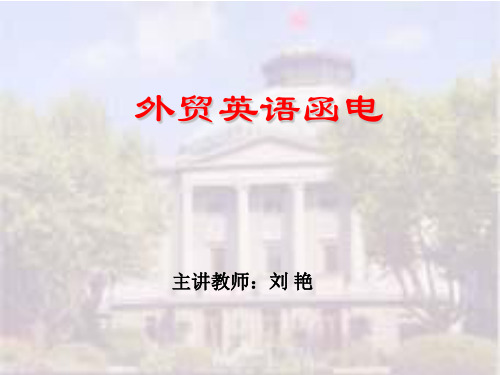
• 学习内容: 本课程主要学习信例,大量学习外贸实 务基本环节中有代表性的信例。外贸实 务基本环节有:建立业务关系、询盘、 报盘和报价、还盘、订单,履行订单、 支付、包装和运输、信用证的修改和展 期、索赔和解决索赔等。
Contents
Chapter 1 Written communication-----an overview
缩写词:YL11/11RVD We have received your letter of Nov 11th.
ASAP As soon as possible
3)There is a close relations between EBC and international trade 内容与外贸业务实践密切相关
• Chapter 7 Terms of Payment • Chapter 8 Letter of Credit • Chapter 9 Packing & Shipment • Chapter 10 Insurance • Chapter 11 Complaints & Claim • Chapter 12 Agency • Chapter 13 E-Mails
1)The Letterhead 信头
• 写信人( sender)的单位名称和地址(包括邮编)。 还可加上电话号码、传真号、及E-mail地址等,以便 于收信人选择答复的方式。有些会将经营项目 ,注册 商标和公司董事、经理等姓名一并印在信头上。如需 打印,则信头位于信纸的右上角
• 信头的作用:1)使收信人一眼就看清来信人的名称地 址;2)便于收信人在回信时抄写地址;3)起广告的 作用
3)The Inside Address 封内地址
• 把信封上的收信人(receiver)的姓名和地址原 封不动抄写在信纸的左上部。日期下端2-3行
Unit 1 Business Letter Writing商务信函写作

Phone Calls, Conversations and Meetings
The main advantage of a phone conversation is that it allows both parties to respond to each other immediately.
Tell us more detailed information on your requirements --- Will you tell us more detailed information on your requirements? --- Will / would you please tell us more detailed information on your requirements?
去除陈词滥调
We have acknowledged receipt of your letter of May10th. → We have received your letter of May 10th.
Enclosed herewith please find two copies of our latest price list for your reference. → We enclose two copies of our latest price list for your reference。
Types of Business Communications
e-mail messages, memos, letters, reports, phone calls, meetings and conversations.
E-mail Message
外贸英语函电第一章 Business Letter Writing -An Introduction

1.1.1 Clearness(清楚) 1. Pay attention to sentence structure to convey your meaning; 2. Avoiding ambiguous sentences and needless jargon; 3. Use plain, simple words and short sentences; 4. Statements in well-constructed sentences and paragraphs.
1.2 The Structure of Business Letters A business letter consists of seven principal parts: (1) the letter-head (including the date) (2) the inside name and address (3) the salutation (4) the subject heading or caption (5) the opening sentences (6) the body of letter (7) the closing sentences (8) the complimentary close (9) the writer’s signature and official position (10) the enclosure (11) the postscript
1.2.4 The Subject Heading or Caption(事由) 事由写在称呼下两行,一般是在信纸中央的位 置,但如果是平头式则由左边沿线写起。写事 由的目的是使对方收发人员看到之后可以迅速 转递给经办人,这对于业务繁忙的外贸公司来 说,可以节约大量时间,并提高工作效率。一 般情况下,事由不要省略,要简明扼要地说明 来信的主旨,例如商品、运输、包装、保险、 信用证和索赔等。有时其前面加上Re:,意思 是“关于”。例如,关于鞋子,Re: shoes;关 于信用证第123号,Re: L/C No.123。
Chapter One Business Letters (商务信函) business_letter_外贸函电
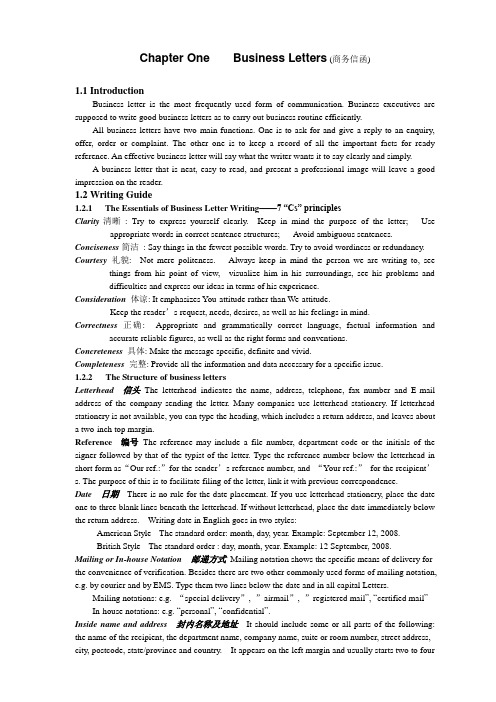
Chapter One Business Letters (商务信函)1.1IntroductionBusiness letter is the most frequently used form of communication. Business executives are supposed to write good business letters as to carry out business routine efficiently.All business letters have two main functions. One is to ask for and give a reply to an enquiry, offer, order or complaint. The other one is to keep a record of all the important facts for ready reference. An effective business letter will say what the writer wants it to say clearly and simply.A business letter that is neat, easy to read, and present a professional image will leave a good impression on the reader.1.2Writing Guide1.2.1The Essentials of Business Letter Writing——7 “Cs” principlesClarity清晰: Try to express yourself clearly. Keep in mind the purpose of the letter; Use appropriate words in correct sentence structures; A void ambiguous sentences. Conciseness简洁: Say things in the fewest possible words. Try to avoid wordiness or redundancy. Courtesy礼貌: Not mere politeness. Always keep in mind the person we are writing to, see things from his point of view, visualize him in his surroundings, see his problems anddifficulties and express our ideas in terms of his experience.Consideration体谅: It emphasizes Y ou-attitude rather than We-attitude.Keep the reader’s request, needs, desires, as well as his feelings in mind.Correctness正确: Appropriate and grammatically correct language, factual information and accurate reliable figures, as well as the right forms and conventions.Concreteness具体: Make the message specific, definite and vivid.Completeness完整: Provide all the information and data necessary for a specific issue.1.2.2 The Structure of business lettersLetterhead 信头The letterhead indicates the name, address, telephone, fax number and E-mail address of the company sending the letter. Many companies use letterhead stationery. If letterhead stationery is not available, you can type the heading, which includes a return address, and leaves about a two-inch top margin.Reference 编号The reference may include a file number, department code or the initials of the signer followed by that of the typist of the letter. Type the reference number below the letterhead in short form as“Our ref.:”for the sender’s reference number, and “Y our ref.:”for the recipient’s. The purpose of this is to facilitate filing of the letter, link it with previous correspondence.Date 日期There is no rule for the date placement. If you use letterhead stationery, place the date one to three blank lines beneath the letterhead. If without letterhead, place the date immediately below the return address. Writing date in English goes in two styles:American Style-- The standard order: month, day, year. Example: September 12, 2008.British Style --The standard order : day, month, year. Example: 12 September, 2008.Mailing or In-house Notation 邮递方式Mailing notation shows the specific means of delivery for the convenience of verification. Besides there are two other commonly used forms of mailing notation, e.g. by courier and by EMS. Type them two lines below the date and in all capital Letters.Mailing notations: e.g. “special delivery”, ”airmail”, ”registered mail”, “certified mail”In-house notations: e.g. “personal”, “confidential”.Inside name and address 封内名称及地址It should include some or all parts of the following: the name of the recipient, the department name, company name, suite or room number, street address, city, postcode, state/province and country. It appears on the left margin and usually starts two to fourlines below the date. It appears exactly the same way as on the envelope.Precede the addressee’s name with a courtesy title (such as Mr., Ms. or Dr.) The person’s job title can be placed on the same line of the person’s name, or on the line below.e.g.: (1)Mr. Dick Eaton, President (2)Ms. Patricia T. HigginsAssistant V ice PresidentIf the name of a specific person is unavailable, you may address the letter to the department, followed by the name of the company.e.g.: (1)Customer Service DepartmentAcme Construction CompanyAttention Line 主送,The attention line is used to name the specific individual the letter is addressed to. It is usually placed between the inside address and the salutation or within the inside address and centered over the body of a letter in the indented style. Its abbreviation is Attn.. It suggests that the sender hopes the letter receives the immediate attention of a certain person or a specific department. Salutation 称呼The salutation is the polite greeting with which a letter begins. Place it twolines below the inside address. The salutation should correspond to the first line of the inside address, The customary formal greeting in a business letter is “Dear Sir”or “Dear Madam”used for addressing one person; and “Dear Sirs”, “Dear Mesdames” or “Gentlemen”for addressing two or more people. If the addressee is known to you personally, a warmer greeting such as “Dear Mr. Smith”is preferred. Quite often now companies are owned and /or managed by women, and it is more and more customary to use the greeting: Dear Madam or Sir, if you are not sure whether the letter will be read by a man or a woman. If the addressee is a group, use “Ladies and Gentlemen”. Or you may use a polite description, such as “Dear Friends”, “Dear SPA supporters”. End the salutation with a colon, or a comma.Subject Line/Caption 标题或事由The subject line is the general idea of a letter. It calls recipients’attention to the topic of the letter. It is often inserted between the salutation and the body of a letter, usually two lines below the salutation. It is also useful as a guide for filing. Some companies omit the word “Subject:”, some replace it with “Re:”or “re:”(meaning “regarding”), and some underline the subject line. The following forms are commonly used:SUBJECT: SALES CONFIRMATION NO. 5678 FOR 300MT OF SOYBEAN OILSubject: Sales Confirmation NO. 5678 for 300Metric Tons of Soybean OilBody 正文This is the most important part of a letter. It expresses your idea, opinion, purpose and wishes, etc. It usually begins one or two lines below the salutation. Lines within a paragraph should be single-spaced and double-spaced between paragraphs.Complimentary Close 结束敬语The complimentary close is purely a matter of custom and a polite way of bringing a letter to a close. It appears one or two lines below the last line of the body. Capitalize the first word and end with a comma. The main words in complimentary closure are as follows: sincerely, faithfully, cordially, respectfully and truly. These words may appear in any of these combinations: Y our sincerely, Sincerely yours.Signature 签名The writer’s signature consists of a handwritten signature and a typewritten signature. Type the name under the complimentary closing, leaving enough blank lines (usually leave three blank lines) to sign your name. Never “sign”with a seal or stamp. Then type the signature identification and title. The writer’s signature should be placed between the complimentary closure and the typed signature.Multiple-Page Letter Heading 多页信的标题When typing a multiple-page letter, use letterhead for the first page. The following page or pages should have the same quality, size and color as the first page. The multiple-page heading bears the name of the recipient or his/her organization, the pagenumber, and the date.Reference Initials 主办人代号Consisting of the signer’s initials in capitals followed by a slash or colon followed by the lowercase initials of the person preparing the letter, this item serves as reminder of who prepared the letter. It should be placed at the left margin, two or three lines below the signature. When you type your own letter, don’t use initials. When the signature block includes the writer’s name, use only the typist’s initials. Reference initials are usually given in the form of “author’s initials/typist initials”, or “author’s initials: typist initials”.Enclosure Notation 附件When there is something enclosed with the letter, type the word “Enclosure”, or an abbreviation of it (Encl.)in the bottom left-hand, a double spaces under the reference initials, with a figure indicating the number of enclosures, if there are more than one.Y ou can use any of the following styles:Encl. :Enclosure:1. Purchase Order No. 12342. Check No. 123Carbon copy Notation 抄送When you send a copy of the letter to a third person, place a notation directly below the enclosure notation or reference initials. The copy notation is indicated with “C.C.”, or “c.c.”which is a holdover from the days of carbon copies. Many companies are now using “P.C.”(for photocopy).Postscript/P.S. 附言If you wish to add something you forget or for emphasis, you may usually add the postscript two lines below the carbon copy notation. Postscript may be preceded by “P. S.”, but this is not strictly necessary. In business letters, postscript is not commonly used, while in personal letters, it frequently appears. This item is usually used in the informal styles of letters.The adding of a P.S. should, however, be avoided as far as possible, since it can appear as afterthoughts, indicating a lack of planning. But studies show that postscripts are one of the first things people read and remember, especially when it is handwritten. It sometimes serves the purposes as a message that requires emphasis, or as a personal note.Look at the following example to see where the different parts go in a business letter.P.S.: Y ou get 5% discount if you book the space by the end of this month.1.2.3 The Formats of a business letterThere are various ways in which the component parts of a business letter can be laid out on the page. Choice of letter format is a matter of individual taste, but it is better to follow established practice, to which the business world has become accustomed. A good plan to make correct practice habit is to adopt one form of letter format and stick to it. The three main formats are as follows.1. Blocked Format With this letter style, all letter parts begin at the left margin. Because this style can save the typist’s time, so it has come to be much widely used and preferred now. The loss of clarity occasioned by the absence of indentations may be made good by increasing the number of separating line-spacing between paragraphs.2. Semi-blocked Format Like blocked format, all letter parts begin at the left margin, except the dateline, complimentary closing, company signature and writer’s identification, which are set against the right-hand margin. They are placed in this position for filing and reference purposes. It is also named as a modified blocked format.3. Indented Format The indented format may follow the same layout as either the blocked or semi-blocked formats, but will differ in that the paragraphs will each be indented by four or five spaces. It is a traditional format, especially in Britain.1.2.4 The Format of envelopes The envelope should match the stationery in color and style. Most companies have the return address in the upper-left corner of the envelope, giving the sameinformation as the letterhead. Otherwise you must type or write your return address the same way as you do for the inside address, usually in smaller typeface than the name and address of the receiver.Name and address of the receiver is always single-spaced with all lines aligned on the left, and they should be in all capital letter, with no punctuation at the end of each line. The order in writing the address is from the smallest division to the largest, just opposite to the Chinese custom in writing addresses.The in-house notation is placed three lines down the return address and is in all capital letters. The stamp is put at the upper right corner of the envelope with mailing notation, if there are any, given in all capital letters below the stamp.The format of the address on the envelope can be in blocked or indented style, but it is better to keep the same format with the inside address of the letter.1.3 Letters for example。
新编外贸英语函电写作教程Unit 1Business Letter Writing

5C
“完整原则”是指,信函内容应提供读者所需要的 所有信息,尤其像询盘、询问贸易条件等需要回复 的信函,内容更需要清楚完整。 信函是否完整,可以用“5W1H”来检验,即:
2018/6/17
Who When Where What why how
7
5C
2018/6/17 10
Writing Model
2018/6/17
11
Writing Model-Structure
一般来说,外贸函电中涉及的每一封信函,均可按 内容的递进分为以下三个部分:
1. 首段问候语(opening paragraph),如下:
2018/6/17
2018/6/17 8
5C
“礼貌原则”是指买卖双方应十分注重措 辞方式,要婉转、礼貌,以便对方接受。 在写作时,可以通过使用虚拟语气、委婉 语气等方法迂回地表达观点、提出要求。 例如:
2018/6/17
9
5C
1. If it were not for the large orders we receive from a number of our regular customers, we could not have quoted for supplies even at that price. 试比较:If it is not for the large orders we receive from a number of our regular customer, we cannot quote for supplies even at that price.
Unit 1 Business Letter Writing
外贸英语函电chapter-1-business-letters

Principles ----seven C’s
Correctness Conciseness Clarity Concreteness Completeness Courtesy consideration
Principles (2)
Language Content Attitude Form
example
A. In the event that you speak to Mr. Wood in regard to production, ask him to give consideration to the delivery schedule
B. If you speak to Mr. Wood about production, ask him to consider the delivery schedule.
Business English Correspondence
Changzhou College of Information Technology Xiao guilan
Brief Introduction of the Course Learning
Aims Requirements Content
Consideration--- ‘you’ attitude Cordial and enthusiastic
examples
Opening 1. Thank you for your letter of February 7th telling
us that … 2. We acknowledge the receipt of your letter dated
Business letter writing Unit 1PPT课件

Unit One Business Letter-Writing
English for International Business Communication
Conciseness
Is a concise letter always a short one? If conciseness conflicts with courtesy,
What are the Three C’s?
Rules to Be Observed in Writing: 3 / 4 C’s
Clearness Conciseness Courtesy Correctness
Unit One Business Letter-Writing
English for International Business Communication
What will be the result if a letter is ambiguous? ■ HUoswe cgaonodth, isstrbaeigahvtfooirdweadr?d, simple English
i. Clearness means:
One sentence for one meaning only.
English for International Business Communication
外经贸英语函电
E-mail: Phone:
Course Requirements
Your regular attendance Homework Exercises
Mid-term examination Final-term examination
1.1. Essentials of Business LetterWriting
(完整word版)外贸英语函电期末重点
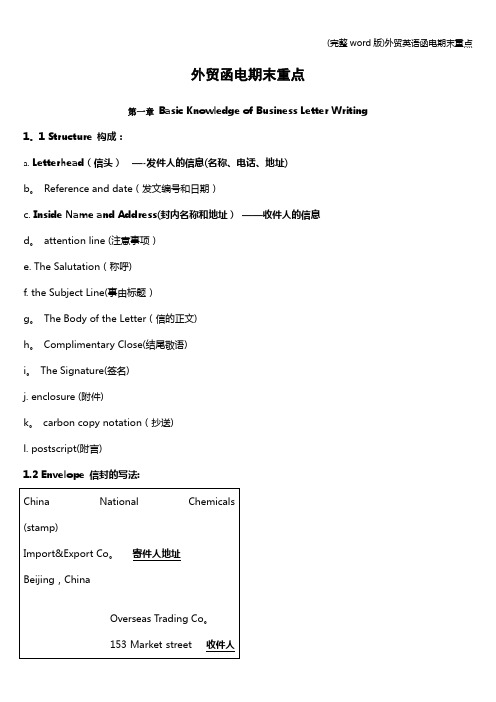
外贸函电期末重点第一章Basic Knowledge of Business Letter Writing 1。
1 Structure 构成:a.Letterhead(信头)—-发件人的信息(名称、电话、地址)b。
Reference and date(发文编号和日期)c. Inside Name and Address(封内名称和地址)——收件人的信息d。
attention line (注意事项)e. The Salutation(称呼)f. the Subject Line(事由标题)g。
The Body of the Letter(信的正文)h。
Complimentary Close(结尾敬语)i。
The Signature(签名)j. enclosure (附件)k。
carbon copy notation(抄送)l. postscript(附言)1.2 Envelope 信封的写法:1。
3 Principle 写信原则:Courtesy 礼貌Conciseness 简洁Clearness 清晰第二章Establish Business Relations 建立贸易关系2.1 Structure第一部分说明信息来源Commercial Counselor office商务参赞处;Embassy 大使馆;Chamber of commerce 商会;第二部分说明写信目的+自我介绍leading importer 主要进口商/ one of the largest importers 最大的进口商之一deal with/ specialize in 专营competitive price 竞争价格/ enjoy great popularity 享有盛誉for your reference 供你方参考; fall(be)within the scope of 属于…的经营范围enter into business relations 建立贸易关系in the market for想要购买/in the hope of doing sth。
Unit 1 Business Letter-writting
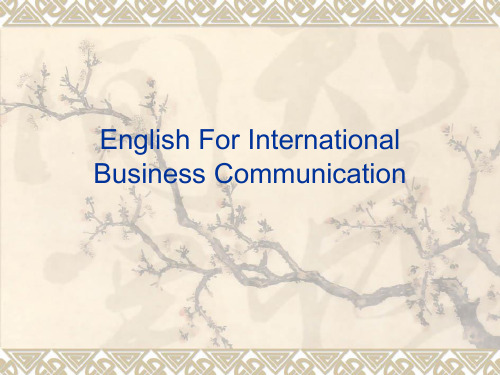
Characteristics of business letters
Let’s
see one more sentence:
We are in the market for silk blouses and should be pleased if you could kindly quote us your keenest prices for the goods listed below:
3. Practice makes perfect
在具备了一定的外贸英语词汇量,掌握了必要的外 贸句型,了解了外贸实务的各个环节之后,我们要 练习如何撰写各种信函的形式。在操练过程中,我 们要由浅入深地分三步实施:1)从英汉互译入手, 先句子,再段落,到全文。2)给定必要词汇和相 关材料,我们可以根据手头上的材料进行组织。3) 自己设计特定的外贸情境,按标准的信函格式自由 发挥。在撰写前,我们要做好构思。例如:写此信 的目的是什么?准备达到什么效果;在撰写时,组 织好语言。用哪种方式展开,是选用演绎法、归纳 法还是时间顺序法等;在撰写后,查找欠缺。此信
在这类的信函中,很多的习惯用语和表达方式有很 大的借鉴价值,特别是开头用语和结束用语,值得 学生学习和仿效。比如请对方早日答复的常用结束 语有: We hope to hear from you soon. We look forward to hearing from you. Your prompt reply is eagerly awaited. We should appreciate your early reply. We look forward to your early reply. Please let us have your reply at once.
unit1 business letter writing

The improved version: We should have received the above order by the end of January. Would you please let us know right away what the status状况 is ?
(以上自动句明显比被动句式清楚的多,一 目了然。)
2. Conciseness
1. 2.
Is a concise letter always a short one? If a letter is ruthlessly concise, what impression will it give to the recipient or reader?
—If a letter is ambiguous, it will cause trouble to both sides, and further exchange of letters for explanation will become inevitable, thus time will be lost. To avoid ambiguity, it is essential to make sure that your letter is so clear that it cannot be misunderstood.
(2)to make or accept an offer —As requested by you some time ago, we take pleasure in making you the following offer, which is subject to your acceptance within 7 days.(按照贵方不久前的要求, 我们高兴地报盘如下,以贵方7天内接受为 有效。) __We find both quality and prices satisfactory and are pleased to give you an order for the following items.
外贸英语函电范文模板(热门16篇)

外贸英语函电范文模板篇1Gentlemen: Sept. 5, 2001We received your letter today and have informed our customers of your situation. As requested, we have instructed the Beijing City Commercial Bank to extend the L/C up to and including September 30. Please keep us abreast of any new development.Sincerely外贸英语函电范文模板篇2I would like to confirm our appointment to discuss the possibility of merging our distribution networks. I am excited of the prospect ofexpanding our trade. As agreed, We will meet of our office in bond street at Monday 20 March. I have scheduled the whole day for the meeting. If for any reason you are unable to attend , please phone me so that we can make alternative arrangements. Please let me know if you would like our office to arrange hotel accommodation. I look forward with great pleasure to our meeting.外贸英语函电范文模板篇3Dear Sirs: , 2001We received your promotional letter and brochure today. We believe that your would do well here in the . Kindly send us further details of your prices and terms of sale. We ask you to make every effort to quote at competitive prices in order to secure our business. We look forward to hearing from you soon..Truly外贸英语函电范文模板篇4We understand from our trade contacts that your company has reestablished itself in Beirut and is once again trading successfully in your region. We would like to extend our congratulations and offer our very best wishes for your continued success. Before the war in Lebanon , our companies were involved in a large volume of trade in our textiles. We see from our records that you were among our best tem customers. We very much hope that we can resume our mutually beneficial relationship now that peace has returned to Lebanon. Since we last traded, our lines have changed beyond recognition. While they reflect e have drawn up a draft agreement that is enclosed. Please examine the detailed current European taste in fabrics, some of our designs are specifically targeted at the Middle Eastern market. As an initial step , I enclose our illustrated catalogue for your perusal. Should you wish to receive samples for closer inspection, we will be very happy to forward them. We look forward to hearing from you.从同行中获悉贵公司贝鲁特复业,生意发展迅速。
外贸函电第二版-Unit 01 英文商务信函写作的基本知识
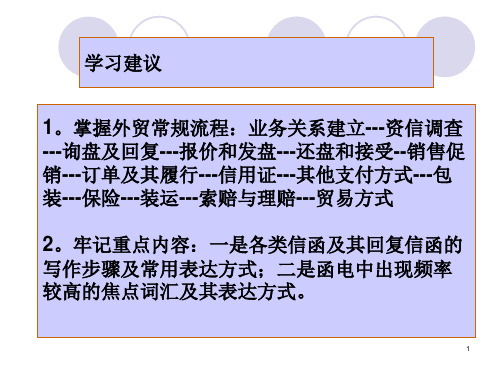
Unit 1 Fundamentals of Writing English Business Letters 英文商务信函写作的基本知识
2
1.1 Introduction(简介)
目的:掌握商务信函的写作要求、写作原 则、以及信封和信函的基本构成和行文要 求。
3
1.2 Requirements for Business Letter Writers (商务信函的写作要求) 要写成功的商务信函,需要起草人具备以下条件: (1)精通英语(Good command of English) (2)通晓外贸理论和实务(Knowledge of business theory and practice) (3)通晓术语(Knowledge of technical terms) (4)通晓人的心理(Knowledge of psychology) (5)熟悉推销艺术(Skills in salesmanship)
如:Mr. John Smith, Page 2, June 3, 2005
20
8. 信尾客套语(Complimentary close) 信尾客套语是一种礼貌,是结束信函的正式方式,类似中 文信函中的“此致,敬礼”等。
常用的有:Sincerely, Sincerely yours, Yours sincerely, Best regards;更亲切一点的有:Cordially, Cordially yours;再正式一些的有:Yours truly, Respectfully yours, Yours faithfully。
4
1.3 Seven Guidelines of Writing English Business Letters(英文商务信函写作七原则)
国际商务函电——完整unit 1 business letter writing

abbreviations and abbreviated phrases 3. There is a close relation between BEC and
international trade
Examples:
in the market for, offer, quotation, order, counteroffer, letter of credit, CIF, FOB, ASAP, P.P.,YL11/11RVD
We will send you the brochure next month.
B. Focus on the positive approach.
Compare:
(positive) We feel sure that you will be entirely satisfied.
(negative) We do not believe you will have cause for dissatisfaction.
(1) Avoid using wordy expressions. For example: Wordy: We wish to acknowledge receipt of your letter… Concise: We appreciate your letter… Wordy: We have begun to export our electronic toys to countries abroad. Concise: We have begun to export our electronic toys.
Unit 1 Modern Business Letters《外贸英语函电》PPT课件

(1)
Jameson & Sons Ltd.
34 Madison Square
Melbourne E.C.2.
Australia
Tel:…
Fax:…
E⁃mail:…
January 25,20_
Our Ref.No.…
Your Ref.No.…
(2)China National Light Industrial Products Import & Export Corp.
connection with our not clearing our account which was outstanding as at
the end of June.
Please accept our profuse apologies.We were unable to settle this matter
associated with business,its activities require human
beings to interact with and react to each other;to
exchange information,idea,plans and proposals;to
letters help the writers as much as the readers,and will probably
mean an earlier reply.
Text B
The Language of Modern Business Letters
Nowadays,more and more people like to do business through a fax machine
Unit 1 Business Letter Writing63页PPT文档

Introduction
The business letter is the principal means used by a business firm to keep in touch with its customers, often it is the only one in that the customers form their impression of the firm from the tone and quality of the letters it sends out. Generally, the function of a business letter may be said: (1) to covey a message; (2) to make or accept an offer; (3) to deal with matters concerning negotiation of business, etc.
本课程的目的是学习外贸业务书信的标准格式, 了解通过哪些途径来发展新客户,开拓新市场, 如何进行询购某商品,怎样报盘和还盘,怎样 灵活运用付款方式,如何做到重合同守信用, 怎样去审查信用证,做到不出差错,在理赔和 索赔中做到有理有利有节;学会拟写信函和电 传传真的写作技巧。
学习内容: 本课程主要学习信例,大量学习外贸实 务基本环节中有代表性的信例。外贸实 务基本环节有:建立业务关系和资信调 查、询盘、报盘和报价、还盘、订单, 履行订单、支付、包装和运输、信用证 的修改和展期、索赔和解决索赔等。
课程简介
本课程是一门将英语与外贸业务相结合的 课程。通过介绍外贸实务中各种英文业务函件, 电传和传真以及其它方式的写作格式,商业术 语和各种不同的表达方法,并通过介绍对外贸 易各环节的具体做法,使学生在提高英语水平 的同时,熟练掌握对外贸易业务中常用的基本 术语及表达技能,培养和提高他们的外贸业务 工作能力
- 1、下载文档前请自行甄别文档内容的完整性,平台不提供额外的编辑、内容补充、找答案等附加服务。
- 2、"仅部分预览"的文档,不可在线预览部分如存在完整性等问题,可反馈申请退款(可完整预览的文档不适用该条件!)。
- 3、如文档侵犯您的权益,请联系客服反馈,我们会尽快为您处理(人工客服工作时间:9:00-18:30)。
信的正文是信的主体,是一封信的核心所在。需要根据中心思 想把正文分为若干段落。
在开始写信之前,必须首先考虑以下两点:
1. 写这封信的目的是什么;
2. 如何以最好的方式去写信。
Since the main purpose of the letter is to convey a message,
1.2.1 The Letter-head(信头)
Giving the day in figures as 12/10/2010 is in bad taste, and it may easily cause confusion, because in Britain this date would mean 12th October 2009, but in the United States and some other countries it would mean 10th December 2009.
punctuation and capital words , and the structure of sentences.
1.2 The Structure of Business Letters A business letter consists of seven principal parts: (1) the letter-head (including the date) (2) the inside name and address (3) the salutation (4) the subject heading or caption (5) the opening sentences (6) the body of letter (7) the closing sentences (8) the complimentary close (9) the writer’s signature and official position (10) the enclosure (11) the postscript
外贸英语函电第一章 Business Letter Writing -An Introduction
About this course
The basic objectives of this course is to provide you a tool to do international business and enable readers to understand with the least possible effort.
statements.
1.1.4 Consideration(体谅) 1. try to put yourself in HIS place; 2. emphasize the YOU attitude; 3. emphasize positive pleasant facts. 1.1.5 Completeness(完整) 1. provide all necessary information; 2. answer all questions asked; 3. give something extra, when desirable.
1.2.2 Inside Name and Address(信内地址) 英文地址常见的组成部分有: (1) name of company (2) number of house and name of street (3) name of city or town (4) county or state and its post-code (5) name of country
1.1.6 Concreteness(具体) 1. to make the message specific; 2. don’t try to write in a literary style; 3. use action rather than camouflaged verbs. 1.1.7 Correctness(正确) 1. to choose the only accurate name of article,
the letter should be written in language that is easily understood.
The following serves as reminders:
(1) Write simply, clearly, courteously, grammatically and to the point;
1.2.8 The Complimentary Close(结束语)
结束语和称呼一样,都是表达礼貌的方式, 使用时表达要适应场合。它也必须与前面 的称呼相符合。
1.2.9 The Writer’s Signature and Official Position(写信人的签名和职位)
在结束语下面,将代表写信人的签名或公 司名用大写打印,必须由负责人签字。签 名的下面为使对方了解签名人的姓名、职 位,可以打印注明,因为签字往往很潦草。 注意:负责人最好用手签名,用橡皮图章 签字是一种不礼貌的行为,说明该信并非 本人亲自过目,不为人所重视。
1.1.2 Conciseness(简洁) 1. in the fewest possible words; 2. briefly but completely. 1.1.3 Courtesy(礼貌) 1. more than Polite; 2. sincere, tactful, thoughtful and appreciative; 3. avoid irritating, offensive or belittling
与其他形式的创作一样,外贸函电的写作没有什么不同, 也是写信人的一种创作活动。良好的英文是写好商业信 函的重要基础之一。写信人应该尽量避免语法错误及各 种词不达意所带来的误解。评判外贸函电及其他很多商 业信函的标准,一般可归纳为7C基本原则。
1.1.1 Clearness(清楚)
1. Pay attention to sentence structure to convey your meaning;
1.2.5 The Opening Sentences(开头语)
开头语没有统一的格式,如果是第一次通 信,可以利用开头语做自我介绍、说明信 息来源、表明写信目的。如果是回信,习 惯上是感谢对方来信,复述对方来信的日 期、编号、主题或者简单内容。
1.2.6 The Body of the Letter(信的正文)
(2) Paragraph correctly, confining each paragraph to one topic;
(3) Avoid stereotyped phrases and commercial jargon.
1.2.7 The Closing Sentences(结尾语) 结尾语用来总结信中所谈到的重要事项,提示
Whenever you get an opportunity, practicing writing in English.
Make amendments to the letters until you find they meet your intended objectives.
Polish your English at all times.
2. Avoiding ambiguous sentences and edless jargon;
3. Use plain, simple words and short sentences;
4. Statements in well-constructed sentences and paragraphs.
1.2.4 The Subject Heading or Caption(事由) 事由写在称呼下两行,一般是在信纸中央的位
置,但如果是平头式则由左边沿线写起。写事 由的目的是使对方收发人员看到之后可以迅速 转递给经办人,这对于业务繁忙的外贸公司来 说,可以节约大量时间,并提高工作效率。一 般情况下,事由不要省略,要简明扼要地说明 来信的主旨,例如商品、运输、包装、保险、 信用证和索赔等。有时其前面加上Re:,意思 是“关于”。例如,关于鞋子,Re: shoes;关 于信用证第123号,Re: L/C No.123。
1.2.3 The Salutation(称呼) 称呼是指写信人对收信人的称呼,位置在封内
地址下2~3行,并与之平头。 在商业信函中一般通用的称呼为Dear Sir或者
Dear Sirs。但美国人通常使用Gentlemen 而不 是Dear Sirs。请注意,不能使用单数的 Gentleman,或者Sir /Sirs。在称呼后用逗号或 者冒号都可以,前者在英国常用,后者在美国 采用。现在一些公司的主管是女性,单数用 Dear Madam 或者Madam。如果不知道对方是 男性还是女性,用Dear Madam or Sir更好一些。
About this course
With time and patience the leaf of mulberry become satin.
本章学习目标
Understand the 7C principles of business letter writing;
了解外贸函电写作的7C基本原则; Master the basic structure of business letters; 掌握外贸函电的基本结构; Get knowledge of the basic styles of business
letters; 熟悉外贸函电格式; Get knowledge of the writing of envelopes. 了解信封写作。
1.1 Essentials of Business Letterwriting
